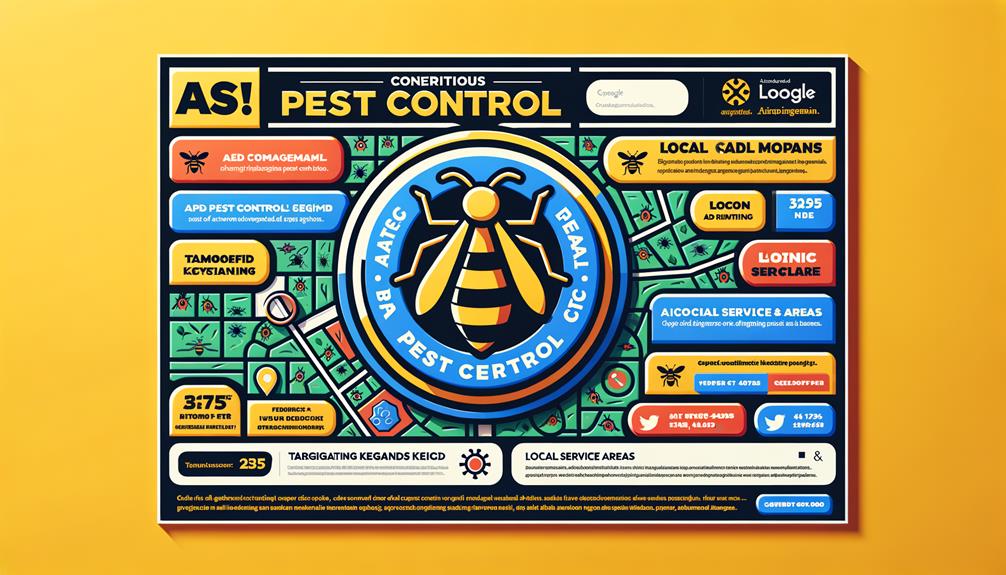Are you tired of seeing your pest control company struggle to attract new clients through online advertising? It’s time to take a closer look at your PPC strategies. With the right approach, you can effectively target potential customers in your local area and drive qualified leads to your business.
By implementing top PPC strategies specifically tailored for pest control companies, you can maximize your advertising budget and see a significant boost in your online presence. But which strategies should you focus on to achieve these results?
Let’s explore some key tactics that can help you elevate your PPC game and outshine the competition in the pest control industry.
Table of Contents
ToggleKey Takeaways
- Conduct thorough keyword research to identify high-intent keywords related to pest control services and target audience.
- Optimize ad copy to improve ad performance and test multiple variations to resonate with the audience.
- Utilize geotargeting features to show ads in specific locations and customize ad content for local relevance.
- Implement conversion tracking and analysis to measure ROI, analyze customer behavior, and make data-driven decisions for better conversion rates.
Keyword Research and Selection

When conducting keyword research and selection for your pest control company’s PPC strategy, it’s crucial to identify high-intent keywords that align with your services and target audience, ensuring optimal ad visibility and relevance.
Start by conducting a thorough competitor analysis to understand which keywords are driving success for others in your industry. This will provide valuable insights into the keywords that are worth targeting and give you a competitive edge.
Additionally, consider incorporating long tail keywords into your strategy. While they may have lower search volumes, they often have higher conversion rates due to their specificity. Long tail keywords can help you capture highly motivated prospects who are more likely to convert into customers.
By leveraging these detailed, niche keywords, you can avoid competing head-to-head with larger companies and instead focus on reaching potential customers who are actively seeking your specific pest control services.
Incorporating competitor analysis and long tail keywords into your keyword research and selection process will enhance the effectiveness of your PPC strategy and maximize your ad performance.
Ad Copy Optimization
To enhance the effectiveness of your PPC strategy for your pest control company, optimizing your ad copy is a critical component that demands strategic attention and precision. Ad copy testing is essential for improving ad performance. Create multiple variations of your ad copy and test them to determine which ones resonate best with your audience. Analyze the data to understand which ad copy generates the most clicks and conversions. Use this information to refine and optimize your ad copy continuously.
Landing page optimization is another crucial aspect of ad copy relevance. Ensure that your ad copy aligns seamlessly with your landing page content. The messaging should be consistent to provide a clear and cohesive experience for the user. Directing users to a landing page that directly relates to the ad they clicked on improves the overall user experience and increases the likelihood of conversion.
Geotargeting and Localized Campaigns

Geotargeting and localized campaigns are essential for maximizing the impact of your PPC strategy. They allow you to tailor your advertising efforts to specific geographic areas and effectively reach your target audience. Here are four key strategies to optimize your local ad campaigns:
- Understand your local audience: Conduct thorough research to gain insights into the demographics, behaviors, and preferences of your local audience. This knowledge will help you craft ad campaigns that resonate with your target market.
- Utilize targeting options: Take advantage of geotargeting features provided by PPC platforms to ensure that your ads are shown to users in specific locations. Refine your targeting based on factors such as location, language, and device to enhance the relevance of your ads.
- Conduct competitive analysis: Analyze the PPC strategies of your local competitors to identify opportunities and challenges in your target market. This analysis can inform your own campaign optimizations and help you stay ahead in the local pest control industry.
- Optimize ad content for local relevance: Customize your ad copy and creatives to speak directly to your local audience. Incorporate local language, references, and offers to establish a strong connection with potential customers in your area.
Conversion Tracking and Analysis
Utilizing conversion tracking and analysis is pivotal for evaluating the effectiveness of your PPC campaigns and making data-driven decisions to optimize your pest control company’s advertising efforts. Implementing ROI tracking and performance analysis allows you to measure the return on investment from your ad spend. By tracking conversions, such as lead form submissions or phone calls, you can attribute them to specific ads and keywords, gaining insights into which aspects of your campaign are driving the most valuable customer actions.
Customer behavior plays a crucial role in conversion tracking and analysis. Understanding how potential customers interact with your website after clicking on your ads can provide valuable data. By analyzing customer behavior, such as the pages they visit and the time they spend on your site, you can gain insights into the effectiveness of your landing pages and website content. This information enables you to make informed decisions about optimizing your website to improve conversion rates.
Incorporating conversion tracking and analysis into your PPC strategy empowers you to make informed decisions, allocate resources effectively, and continually refine your campaigns to achieve better results.
Negative Keyword Management

As you refine your PPC campaigns for your pest control company, honing in on negative keyword management becomes essential for optimizing your advertising efforts and maximizing the return on your ad spend.
Here are four key strategies for effective negative keyword management:
- Continuous Refinement: Regularly review search terms and identify irrelevant keywords triggering your ads. By adding these as negative keywords, you prevent your ads from showing for irrelevant searches, thereby conserving your budget allocation for more relevant queries.
- Competitor Analysis: Analyze your competitors’ ads and search terms to identify negative keywords they may have missed. This can help you stay ahead by avoiding the same irrelevant searches and maximizing the visibility of your ads to potential customers.
- Long-tail Negative Keywords: Utilize long-tail negative keywords to filter out highly specific and irrelevant searches. This targeted approach ensures that your budget allocation is directed towards reaching potential customers with genuine interest in your pest control services.
- Use of Keyword Tools: Leverage keyword research tools to identify potential negative keywords and expand your negative keyword list. This proactive approach helps in preventing wastage of your budget on non-converting clicks.





